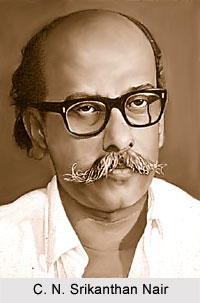 C. N. Srikanthan Nair was a renowned author in Malayalam literature. He was responsible for noteworthy changes in the concept of drama in Kerala. He started as an effective political speaker and later distinguished himself as a journalist in Malayalam language newspapers, especially an editor of weekly magazines. He became noted as a short-story writer, but soon entered the field of drama and gained recognition as a playwright.
C. N. Srikanthan Nair was a renowned author in Malayalam literature. He was responsible for noteworthy changes in the concept of drama in Kerala. He started as an effective political speaker and later distinguished himself as a journalist in Malayalam language newspapers, especially an editor of weekly magazines. He became noted as a short-story writer, but soon entered the field of drama and gained recognition as a playwright.
Early Career of C. N. Srikanthan Nair
His first play Nashtakkachchavatam i.e. "Transaction at a Loss" in 1957 was enthusiastically received by the literary world as well as the amateur Malayalam theatre. From then on, he played a leading role in shaping the course of Malayalam dramatic literature. Nashtakkachchavatam and its successor, A kani tinnarutu or "Don`t Eat That Fruit" in 1959, were realistic well-made plays dealing with strife and agony brought about by social situations and human nature. They broadly conformed to the Ibsenian model. The concentrated development of themes, the progressive build-up of the conflict through every scene and spoken word, the boldness with which the personalities were presented along with social realities, all contributed to their stage worthiness.
Life as a Dramatist for C. N. Srikanthan Nair
Three poetic plays written by C. N. Srikanthan can be mentioned as Kanchana Sita or "Golden Sita" in 1961, Saketam in 1965, and Lanka-Lakshmi i.e. `Lakshmi of Lanka in 1976. These were originally interpreted important developments in the Ramayana. They broke the fetters of realism and projected imaginative, artistic portrayals of the mental struggles and pain undergone by the respective protagonists, Lord Rama, Dasaratha, and Ravana. The scenes and the characters` actions were not conceived naturalistically. They were close to the traditional idea of Indian theatre in which the content is bhava and not a sequence of events. At the same time, Nair maintained the general structure of contemporary drama, thus making their form a blend of the traditional and modern. Hence these plays necessitated new styles of acting and presentation that transcended naturalism. The eminent film director G. Aravindan cinematized Kanchana Sita in 1977.
C. N. Srikanthan Nair also took up the challenge of evolving a mode for the newly conceptualized Tanatu Natakavedi movement, for which he wrote Kali. This was semi mythical in plot and style. Its production was not quite effective, but the experiment inspired other dramatists and directors associated with the new dramaturgy to pursue the goal of an indigenous theatre.






